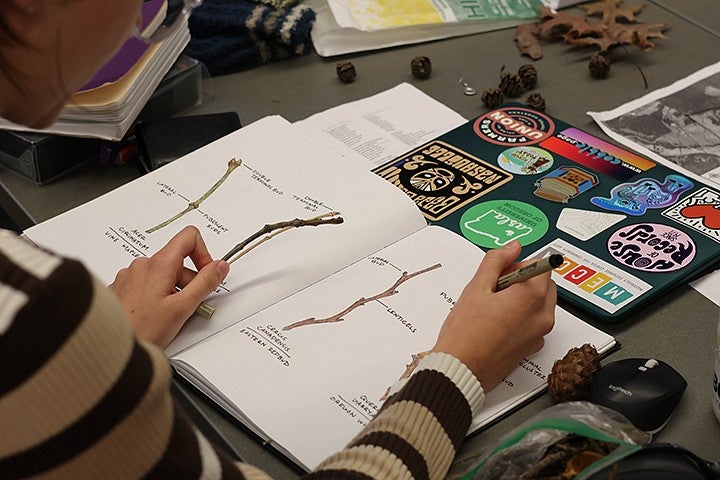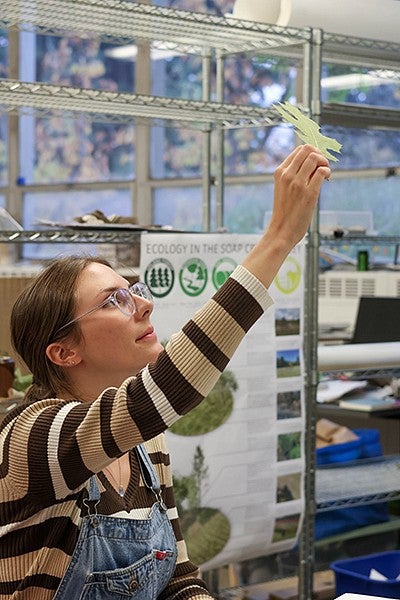
Building the world around her

Favorite Author: Toni Morrison
Go-to restaurant in Eugene: Morning Glory. I love that they're all-vegetarian.
Coffee or tea: I drink tea every day. Earl Grey in the morning, green tea with honey in the afternoons, and the Trader Joe's Well-Rested Blend at night (but rarely ever all three every day).
Favorite hike in Eugene: Eagle’s Rest out by Dexter Reservoir. You have to drive to get there, but it’s worth it for the sunset.
What did you want to be when you grew up? An artist for a long time, and also a park ranger.
Favorite class you've taken at the CHC: The one I’m currently taking — "Black Feminist Literature" with Courtney Thorsson.
Mia Owen remembers growing up in Nashville, Tennessee, a city where public transportation has its share of problems and sidewalks in the surrounding area are few and far between.
An avid runner who ran cross country in high school, Owen would put in miles up and down the same stretch of sidewalk on the outskirts of her hometown. Even though she tired quickly of running the same route, she could either stick to the path or risk getting hit by a car, which she had come close to doing on more than one occasion.
Now a Clark Honors College junior, Owen remembers how the danger of running at home left her wondering generally about public safety. “I was just running for fun, so for someone who had to get to school on the bus or walk to school, it would be way harder,” she says.
Owen’s experience living in a place that isn’t pedestrian-friendly has informed her desire to help create sustainable, well-structured communities through design. At the CHC, she’s a landscape architecture major who is following her path to make a difference. “It was exactly the intersection of what I wanted to do,” she says.
After starting at UO in environmental studies, she settled into the landscape architecture major after seeing the opportunities it offered for real-world applications of the sustainable practices she was learning about in her environmental studies classes. She wanted to apply the technical reading and writing skills she gained as a student at the Honors College with landscape architecture.
For Owen, being in both the College of Design and the Honors College has contributed to what she considers a well-rounded education. “Especially within (landscape architecture), many people focus solely on design,” she says. “They don’t get that interdisciplinary education that I do, which I definitely see as a leg up.”
Despite her love for the two programs, there was a time when she wasn’t sure if she could pursue both. Landscape architecture can be daunting, with a 180-credit course load. That, combined with the academic expectations of the Honors College, left Owen uncertain whether she could pull it off. It was something that nobody else was doing.
“I had a lot of support from advisors, but I didn't have anybody else that was going through the same experiences and like curriculum as I was,” she says.
Design on the mind
Owen’s presence as a well-rounded student in the CHC and design school is mirrored by her well-rounded nature in other parts of her life. From a young age, Owen was learning how the world around her worked.


Owen’s parents were engineers. Her mother was an electrical engineer and her father was a mechanical engineer, and the two met while designing jet engines together. “They’re analytical thinkers,” Owen says. “When they see something, they have to know how and why it works.”
Growing up with this mindset and watching science shows like “How It’s Made” influenced Owen’s curiosity about the world around her. She says she always asks herself, “How does this work? And how can I make it better? And how can I fix it?”
She remembers whenever her family would visit a museum, park, or zoo, her brother and her mom would always race to find the map that showed visitors where to find the exhibits. She thought it was silly at the time. “But now I’m looking at maps every single day — analyzing them for my major and hopefully for my job,” Owen says. “It’s so funny that I can see where that came from directly.”
Owen’s parents have drifted away from engineering. Her father now works in technology at the middle school she attended and her mom has taken up jobs in the design world. For a long time, her mom worked alongside a licensed landscape architect, contributing to the detailed design work that goes into landscaping.

In one of her family’s many travel pursuits while Owen was growing up, she remembers her mom being especially fascinated with the design of garbage cans in Seattle. At the time, her mom was pursuing a master’s degree in sustainability. The cans proved to be the pinnacle of sustainability and landscape design for Owen’s mom.
“I remember looking back at photos from that vacation, and half of them are just photos of different trash cans,” Owen recalls. “And now, every time I go up there, I joke to her and send her a picture of a trash can. I’m getting the degree that my mom always wanted but never knew that she wanted.”
A balancing act
Owen was originally drawn to Oregon for its combination of abundant nature and the outdoorsy culture. The CHC allowed her to feel more connected to her academics at an out-of-state school. “I love the fact that the honors classes are so interdisciplinary, and they’re so interesting,” Owen says. “You can really pick your experience.”
When a peer dropped the Honors College, Owen wondered if it was possible for her to succeed with the workload of both disciplines. “I’ve always wanted to stay in the Honors College because I’ve loved all of the classes that I’ve taken,” she says. “So that wasn’t something that I wanted to leave at all, but it almost felt like I didn’t have a choice because I was kind of paving the way alone.”
She has relied on Associate Professor Liska Chan, a College of Design faculty member who had previously worked in administration at the Honors College, for support. When she thought she’d have to decide between the two, Chan helped her think about ways to succeed in both.
“I ended up just sticking with it because I really, really wanted to,” she says, “I get all of these cool connections and relationships and learning experiences that I wouldn’t have otherwise.”
“Especially within landscape architecture, many people focus solely on design. They don’t get that interdisciplinary education that I do in the Honors College, which I definitely see as a leg up. I want to show people that you can do both. With any degree, it’s possible.”

Owen has particularly enjoyed how her honors education has meshed with to her landscape architecture work. Her current CHC class, “Black Feminist Literature,” applies directly to her current studio project. She’s working on a historical site in Oregon where Letitia Carson, one of the state’s first Black woman landowners, lived. “It’s providing a lot of background knowledge and history of Black feminists, and I’m writing and reading about a specific Black feminist in my studio class, too,” she says.
Chan, who heads the College of Design’s landscape architecture program, says Owen’s work ethic and growth are noticeable.
“She’s very much a self-starter and motivated to find her way on her own,” Chan says. “I’ve gotten to see her design work and see her speak very intelligently and comprehensively about her design projects.”
Outside the classroom, Owen contributes her leadership skills to the UO student chapter of the American Society of Landscape Architects and Kitchen Sink Magazine, where she’s a chief designer. She also works as a peer mentor and tour guide for the Clark Honors College.
Angela Rovak is the director of first-year experience at the CHC and leads the college’s peer mentor program. She says watching Owen go through the experience of determining how to handle her academics has been enlightening to watch. “She’s made me a better advisor just by allowing me to watch her go through that process,” Rovak says.
For her CHC thesis, Owen wants to research sidewalks, accessibility, and commuter infrastructure in Nashville to help offer solutions that help people stay safe. “There’s a park a five-minute walk from my house, but I can’t get there because there’s a busy road that I have to go on with no sidewalk,” she says. “It’s just not walkable.”
She hopes to have a positive impact on her hometown and also leave an impact on the CHC community. “I want to show people that you can do both,” she says. “With any degree, it’s possible.”
